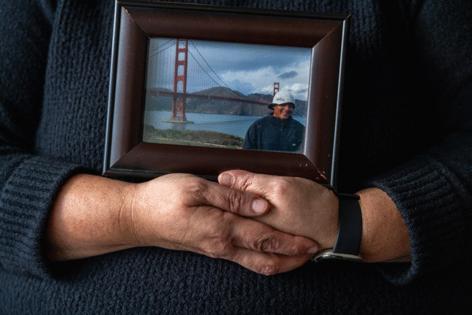Supreme Court skeptical of siding with LA man denied visa over tattoos
Published in News & Features
WASHINGTON — Supreme Court justices sounded skeptical Tuesday about siding with a Los Angeles couple who claimed the wife's constitutional rights were violated when the government denied a visa to her Salvadoran husband, in part over his tattoos.
While some justices said they agreed that denial of a visa to a U.S. citizen's spouse could in theory infringe on the citizen's constitutionally protected interests, a majority indicated they believed the government had fulfilled its legal responsibilities in the matter at hand.
At issue was the case of a Los Angeles man who was denied a green card after marrying a U.S. citizen. As a result, Luis Acensio Cordero, who is from El Salvador, has been separated from his wife, Los Angeles civil rights attorney Sandra Muñoz, since 2015.
The couple sued, arguing the federal government had violated her constitutional right to marriage and due process by failing to provide a timely explanation for denying Acensio's visa.
Initially, the government said it denied the visa due to concerns that Acensio would likely engage in unlawful activity if allowed back in the U.S. Later, through the lawsuit, the couple found out the federal government believed he was an MS-13 gang member, based in part on a review of his tattoos.
Biden administration lawyers have argued that because Muñoz and Acensio could choose to live outside the U.S., her right to marriage has not been violated. The administration also argued that immigration officials should have broad discretion when deciding who to admit into the country.
And they said requiring the government to disclose specific details about the evidence and intelligence used in such decisions would pose a risk to public safety and could chill future information-sharing with foreign partners.
Justices Sonia Sotomayor and Elena Kagan suggested the government's initial explanation for the denial was too vague.
"How does a citation to unlawful activity tell anybody anything?" Sotomayor said.
Other justices appeared to agree that the government had provided sufficient explanation as currently required under the law, and that State Department decisions on visas should not be second-guessed by judges.
Justice Neil M. Gorsuch and Chief Justice John G. Roberts Jr. questioned what additional information or explanation should be required of the government, if the case were sent back to lower courts for further review, as the couple sought.
"Why are we here?" Gorsuch asked. ""I'm not sure what the cause of action here is."
Eric Lee, Muñoz's attorney, said they would like to file a new visa application with evidence refuting the MS-13 membership allegation — and assurance that the federal government would review it.
If the court sides with Muñoz, other families could be entitled to some explanation about why they were denied visas.
Last month, members of Congress, former Department of Homeland Security officials and former consular officers submitted friend of the court briefs in support of Muñoz and Acensio.
©2024 Los Angeles Times. Visit at latimes.com. Distributed by Tribune Content Agency, LLC.







Comments